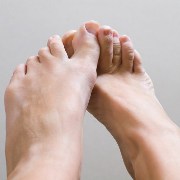Women who use low-carb diets to lose weight quickly run the risk of developing gout. Gout is a disease caused by inflammation from an accumulation of uric acid crystals around the joint. Your body may make too much uric acid, or have difficulty getting rid of uric acid. Not everyone with high uric acid levels in the blood has gout.
Symptoms of gout can begin suddenly, often in the big toe, with acute pain that may come and go in a day (a gout attack). Attacks may not recur for some time, although typically when someone has had one attack, they will eventually get another.
Some questions you may want to ask your doctor about gout might be:
- Who gets gout? Although men between the ages of 40 and 60 are generally more likely affected by gout, sometimes when a person has another disease such as diabetes, kidney disease, sickle cell anemia, leukemia, and similar disorders she may have problems eliminating uric acid from her body making her more susceptible to the condition. Other risk factors for developing gout include genetics (family history of gout), weight, alcohol consumption, diet, and lead exposure.
- How is gout tested and diagnosed? Your doctor may perform a blood test, urine test, or a synovial fluid analysis to check for uric acid levels, joint x-rays, or synovial biopsy.
- How is gout treated? Many people treated for gout can control their symptoms and live productive lives. The most common way to treat a gout attack is with nonsteroidal anti-inflammatory drugs (NSAIDs) taken orally, or corticosteroids. In more extreme cases, the doctor may prescribe colchicines
- What is the long-term risk? Extreme or advanced cases of gout could cause deformation of joints and kidney stones, or deposits in the kidneys leading to chronic kidney failure.
- What information should I share with my doctor if I suspect gout? It is important to keep track of symptoms, medications and supplements, what seems to help or worsen your condition, personal and family medical history, and share it with your doctor.
- Can gout be prevented? There is no known preventation for gout, but it is possible to avoid further damage to joints with treatment, avoiding alcohol.
- What can I do at home to help my condition? Doctors recommend following a low-purine diet (green vegetables, tomatoes, fruits and fruit juices, breads not containing yeast, nuts, milk, butter, cheese, chocolate, coffee and tea). Foods like beef, pork, bacon, lamb, seafood, and yeast should be avoided. Asparagus, cauliflower, mushrooms, peas, spinach, whole-grain breads and cereals, white poultry, kidney and lima beans should be used in moderation only.
- Is there any research I can do on my own and which sources would you recommend? Your doctors can suggest their favorite web sites and/or support groups for obtaining more information and helping you cope with gout.
Resources:
www.miams.nih.gov Gout
www.health.google.com Gout
www.joint-pain.com Low Purine Diet
Do you have a question about gout? Check out EmpowHER’s arthritis page. Sign-up, post a question, share your story, connect with other women in our community and feel EmpowHERed!




